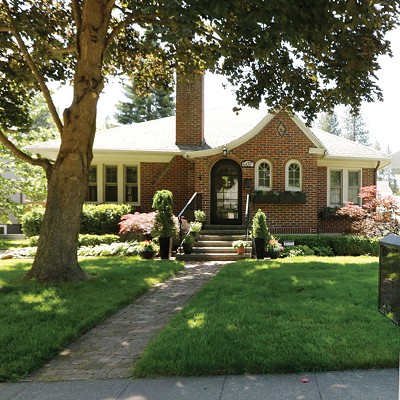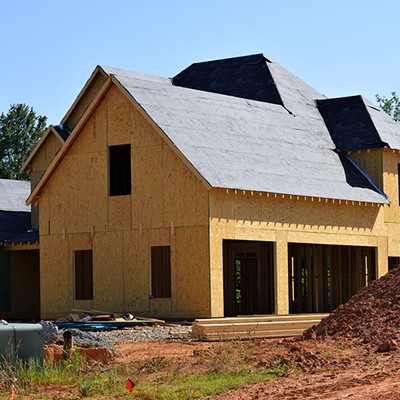
When realtor Marianne Guenther Bornhoft contacted the Inlander last week, she spoke quickly, almost frantically. The local real estate market's booming. Properties have been selling as soon as they hit the market. Her business is thriving. Last Thursday, she worked a 16-hour day. On Friday, she sold three houses over asking price after three different bidding wars.
But that's not what she was calling about.
"I want to say this. I am scared," Bornhoft said. "I'm a little scared that people are going to, again, get ahead of themselves."
She sent a link to a recent TV news story about the thriving local market. "I have a different take on this video, and it is not all roses," she said.
Bornhoft remembers a decade ago, when the national real estate market peaked, driven by rampant speculation, loose lending and wild hype over the housing market. And then she remembers the day — July 15, 2007 — when not a single buyer or seller called her. The bubble had burst. People had lost their jobs and lost their homes.
This latest frenzy is not a bubble, she says. Not yet. But it is a recipe for dangerously unrealistic expectations that can trap overly optimistic homebuyers.
Aaron Cunningham, owner of the Citibrokers firm, has had similar worries.
"I'm making more money today than I've ever made, right now," Cunningham says. "However, like, when times are good, it's really easy to get stupid."
Last Wednesday night, Cunningham says, he was working late, looking through national news articles to see who was fretting about a housing bubble. "There's not a lot of people saying there's a bubble coming," Cunningham says. "That doesn't make me more comfortable; that makes me more nervous."
He's also seen the impacts of the recession — he would buy Spokane-area houses that had been foreclosed, and flip them for a profit.
"I don't think we have a sustainable market right now," Cunningham says. "A lot of real estate agents are killing it right now, and they're making a lot of money, and they don't see an end in sight... Over every mountain there's a valley."
At least when it comes to real estate, Spokane doesn't have an exciting reputation. Compared to markets like Las Vegas, Spokane hasn't experienced the wild benders of the booms, nor the subsequent hangovers of the busts. Spokane's market tends to lag, at least when it comes to recovery.
"Kind of like with furniture and clothing trends, we're a year or two behind everyone else," Cunningham says. "We're slower to get off the couch, if you will, to jump into the market."
That's a lot of what's driving the recent frenzy. The economy has improved. Consumer confidence is high. The word is spreading that the water's fine — so everyone's jumping in.
"We were so undervalued in crisis that we were playing catch-up," Bornhoft says.
Last year teed up the current boom. Rob Higgins, executive vice-president of the Spokane Association of Realtors, says that 2015 saw a nearly 18 percent jump in home sales compared to 2014.
In most years, Bornhoft says, sales slow down in the winter before ramping up in the summer. But this past winter, she says, the slowdown never happened. It's resulted in far fewer available houses on the market — especially those at more affordable price points.
"We're seeing a huge drop in inventory, compared to what has been normal," says Susie Luby, president of the Spokane Association of Realtors. "We're down 19 percent."
And with that, simple economics come into play: With more demand and less supply, prices start rising. The average closing price last month was 12 percent higher than in March of 2015.
"This year is not like any other year in a long time," Bornhoft says. "The bidding wars are so over the top."
Cunningham says that one of his investors had 10 offers within 24 hours of listing a more affordable property in Spokane Valley, and ended up selling it for $10,000 more than his listing price.
"This is what just showed up while I was showing a house. It's a wild market out there," realtor Brigette Murphy wrote on Facebook, over a photo of five cars lining both sides of the street on a manicured lawn. "They were all lined up to see the same house I am showing. #WaitYourTurn."
Cunningham says he's seeing emotion-driven buying, rather than looking at what's going on objectively.
"It's almost like Black Friday," Cunningham says. There's a fear, he says, that if they don't buy now, they'll never be able to afford anything.
"We're seeing a little bit of what we saw before the market crashed," Cunningham says. "There's a pent-up aggression. I think there's a lot of people who are ... out there overpaying for property because they've been sitting on the sidelines so long."
Bornhoft says she isn't worried about a collapse at this point. Bank regulations are a lot tighter than in the days of subprime, no-income-no-job-no-asset loans. But if we start seeing 15 or 20 percent growth in housing prices a year over a couple of years, Bornhoft says, that's when things get dangerous: "It creates a false sense of security that people can randomly spend money."
Any time there's a big change in the market, of course, there will be people looking to make money off of it. In the past year, three different Trump University-style seminars have come to town, Bornhoft says, promising they'll train you to make big money by flipping houses. On Sunday, HGTV aired a pilot of a house-flipping series, starring a team of two Spokane women and focused on the South Perry neighborhood.
Yes, real estate can be a good investment, Cunningham says. He's made plenty on it. But don't buy a home for more than it's really worth, he says, just because you're assuming that the market will keep climbing. You make money by finding a house that's undervalued — that you could improve with some easy fixes — not by playing houses like stocks.
This weekend, the Spokane Association of Realtors is holding its annual open house weekend, with hundreds of participating houses. It may not be a buyer's market, but if you know what you're doing, realtors say, it can still be a good time to buy. Interest rates are still low. And if you're a seller, it's a really good time to list your house.
The key is to realize that traditional rules still apply, Cunningham and Bornhoft say. If you think you're going to move in two or three years, it's probably better to rent. Don't let emotion control your buying decisions, they say.
"Realize that you are in competition," Bornhoft says. "If you think something is a good buy... there's probably 10 other people who think the same thing. You have to put a limit on what you want to spend."
Investors like Cunningham are used to being ahead of the curve. But that's what's weird right now: the uncertainty of it all. That's why he's looking long-term, not short-term.
"It's hard to be one step ahead right now, because I just don't know," Cunningham says. "I sit there at my desk saying, 'I don't know what's coming.'" ♦

























